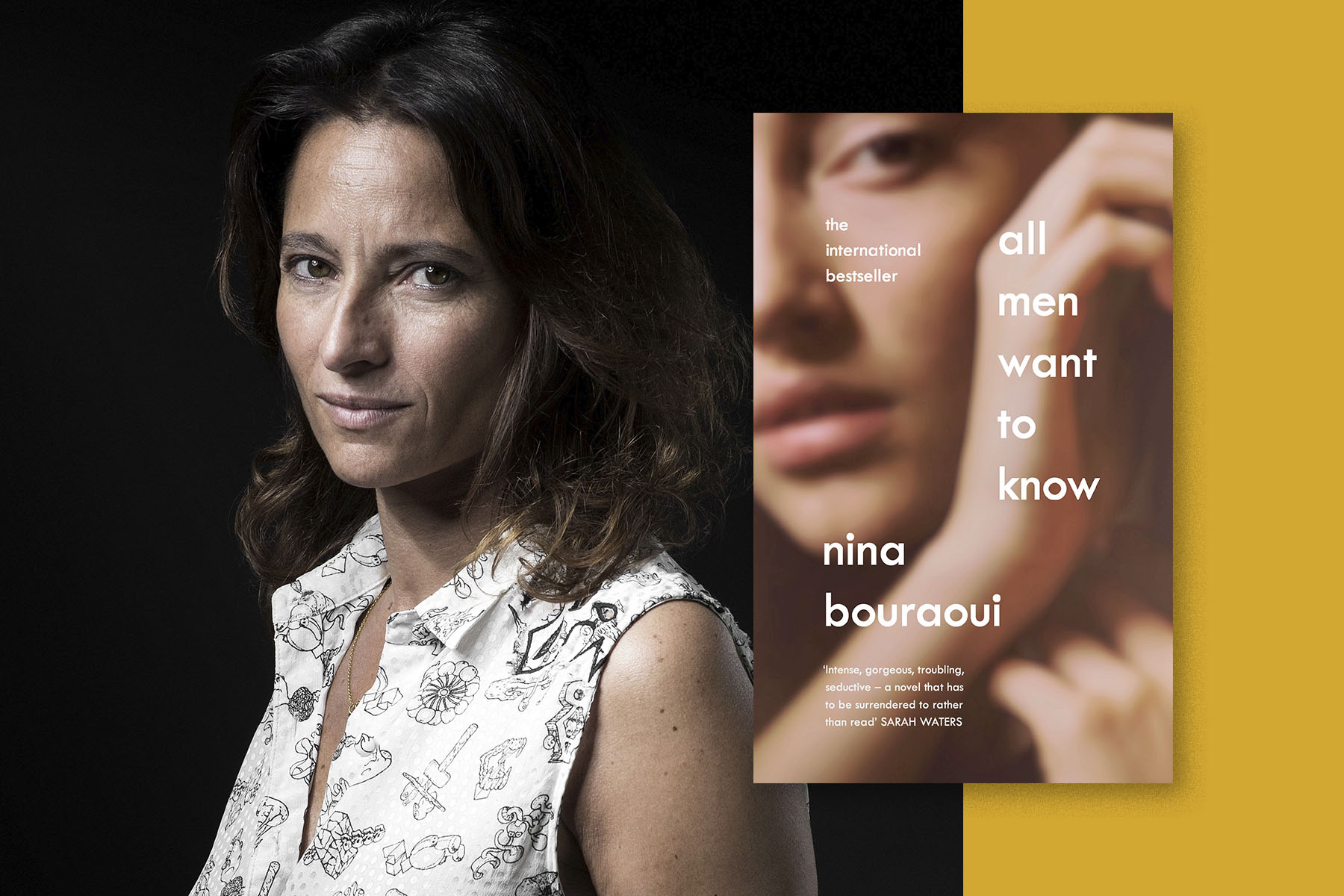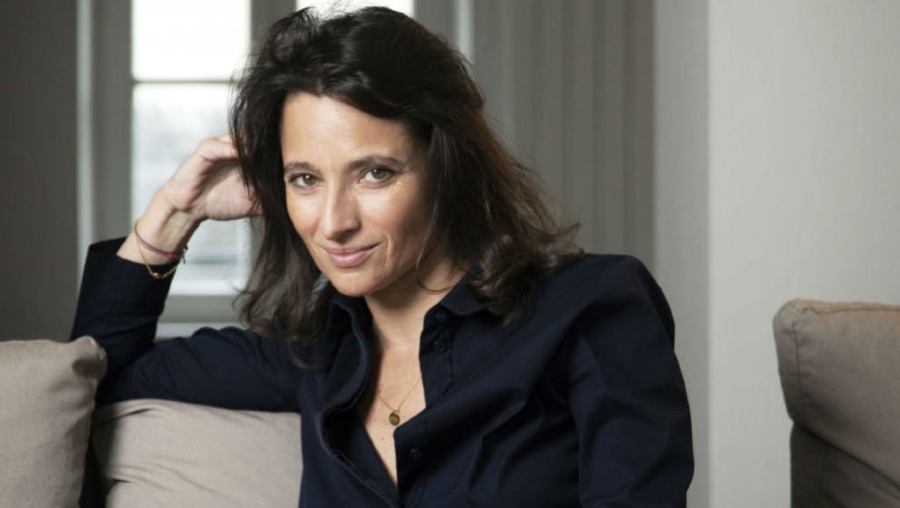- Home |
- Search Results |
- Nina Bouraoui is a French literary icon; in her first UK novel, she finds the words her mother couldn’t
Nina Bouraoui is a French literary icon; in her first UK novel, she finds the words her mother couldn’t
In her first English-translated work of autofiction, All Men Want to Know, the writer untangles her troubled coming of age from her mother’s sexual assault. Here, she explains how language helped her make sense of trauma and write the “most upfront” book of her career.

“I begin to write when I first start going to the Kat,” asserts Nina Bouraoui early in her autobiographical novel All Men Want to Know.
The Paris nightclub isn’t just a location but a central character in Bouraoui’s work of autofiction, one whose demise is already foretold when she introduces it on the novel’s second page: “Rue du Vieux Colombier, the Katmandou, a women-only club in the 1980s, a theatre now.”
Mere pages later she reiterates, “I can’t separate the Kat from my first urge to write.” It’s clear the author wants us to know: this is the locus of her first foray into a life of literature.
And what a life it’s been: Bouraoui, a literary household name in her native France, is the author of over a dozen novels and works of autofiction, and a commandeur of the Ordre des Arts et des Lettres (the French equivalent of the Order of the British Empire) alongside names like T.S. Eliot and Jorge Luis Borges. She’s written songs for Celine Dion, and won the prestigious Prix Renaudot for her 2005 novel, Mes Mauvaises Pensées.
The book’s chapters – short bursts of prose never more than a couple of pages long – leap back and forth through time
All Men Want to Know, the English-language translation of her 2018 novel Tous les hommes désirent naturellement savoir and her long-overdue, first-ever publication in the UK, continues Bouraoui’s longstanding tradition of excavating the nuances of identity. A coming-of-age work of autofiction, it traces Bouraoui’s childhood through to adulthood, though not in that order. The book’s chapters – short bursts of prose never more than a couple of pages long – leap back and forth through time, distinguished by just three alternating chapter titles until the novel’s end: some are named Remembering, some Becoming, and some Knowing, depending on when they happen.
To new (read: Anglophone) readers, it might seem an unremarkable detail that Bouraoui’s desire to write started at the Kat. But for anyone familiar with Bouraoui’s career, in which she’s made a trademark of sharing and baring her the intimate details of her life – her childhood spent between Algeria and France, her queerness, and her family, always in stark but poetic prose – for artistic purpose, the question demands asking: why, in her lifetime of bold, self-expressive writing, did it take until her 50s for her to open up about the site of her literary awakening? What else might Nina Bouraoui holding back?
Bouraoui's mother utters words that provide the novel’s thematic thrust: "Without a name, nothing can exist.”
Revelations like these, told with such honesty and intimacy, have made Bouraoui a queer icon.
“I’ve always considered it my mission to bring light to the spaces occupied by the weakest,” she says, “to use my books as a way of giving voice to those who’ve never had the opportunity to speak. My readers are aged between 15 and 85! They all thank me when they meet me. Cutting through the loneliness of a young gay person, helping them with my words – for me, that’s a great victory and a source of immense pride.”
But while her revelations about the Kat might be the first to surface, as All Men Want to Know proceeds, and probes deeper into her past, ever more intimate revelations come to light.
“It’s the most upfront of my books” she says. “It reveals some of my mother’s secrets: [the character] Monsieur B., and the time she was assaulted in Algeria.”
In All Men, Bouraoui’s childhood, adolescence and sexual awakening are juxtaposed and interwoven closely with those of her mother, whose own experiences as a young woman the young Bouraoui can’t help but internalise. In one particularly disturbing chapter, her mother returns home from a violent assault with “her dress torn, drops of spit in her hair, her skin streaked with grime”; in response, Bouraoui vows to “make it my duty to protect other women from danger”. A man at the grocery shop in a later chapter “puts his hand on my mother’s crotch”, which Bouraoui’s mother ignores for a short time before turning to her daughter and uttering words that provide the novel’s thematic thrust: “I’ve learned how to ignore things for which there are no words. Without a name, nothing can exist.”

There are even further, more traumatic reasons Bouraoui’s mother might not want those words: Monsieur B., a veteran who stays at Bouraoui’s grandparents’ house after the Algerian War of Independence, for whom, writes Bouraoui, “children were what he loved more than anything else in the world, slipping into their bed to embrace them as they had never been embraced before.” Her mother was one of those children.
From these moments stem Bouraoui’s impulses: she spends All Men Want to Know disentangling her desire for women from male violence while simultaneously finding the words to do so. It’s new and difficult territory for Bouraoui, who credits her age with the ability to discuss her mother-daughter relationship, and the trauma that came with it.
“Being over 50 has made it easier for me to write with fewer filters. I really wanted to write something autobiographical that was poetic and that hid nothing. I’ve written in this book about a disturbing and violent episode in her childhood for the first time and also about an assault she suffered that was a turning point in my own childhood.”
But where her mother found solace in the absence of names, Bouraoui was never, she says, “capable of hiding who I am, of lying”. It’s what has made Bouraoui an icon, what makes All Men Want to Know her most fearless work.
“In those days, refusing to name things was a way of denying their existence. I chose to do the opposite.”
“In those days, refusing to name things was a way of denying their existence. I chose to do the opposite: to spend my time searching for the words that let me get as close to the truth as possible without ever forsaking the vital, poetic aspect of my work.”
By the end of All Men Want to Know, Bouraoui uses a fourth chapter title: Being. In that handful of chapters, she inhabits both the past and present, at once.
“I wanted my writing to flow like the workings of memory,” she explains. “Memories arise at random, but in the end, they overlap and fit together. I hadn’t given the titles chapters when I started, but I came to realise that this book was actually a sort of handbook for living for the heroine, who is able to accept and fully embrace her queerness through becoming a writer.”
All Men Want to Know reflects Bouraoui’s deep, empowering belief in language.
“I’ve never stopped writing. Being creative has helped me get over my neuroses, my anxiety, my fear of emptiness. I believe it’s possible to move things forward with gentleness and sincerity: fearsome weapons, far more powerful than violence.”
What did you think of this article? Let us know at editor@penguinrandomhouse.co.uk for a chance to appear in our reader’s letter page.